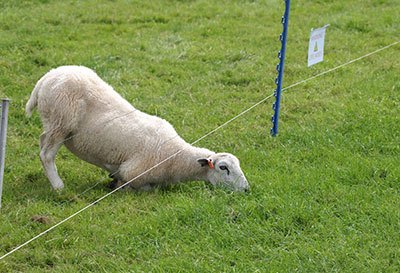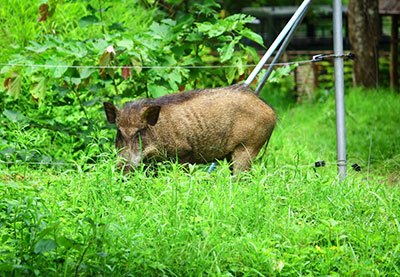In this modern era of farming, electric fences have become a popular solution for containing livestock in one area. They offer an efficient and safe alternative to other traditional fencing methods, like barbed wire or wooden post installations.
But how well do animals understand the dangers of an electric fence? Can they sense its presence and if so, how can it be used more effectively?
In this comprehensive guide, we’ll uncover all there is to know about understanding animal behavior when it comes to electric systems.
Take away key points:
- Animals might sense or hear the fence so they will stay away from your grass
- Your dog or other pet might wear a collar to begin training sessions and learn to respect the limits
- Read our guide to learn more about animals sensing the fence and their conduct at that point
Table of Contents
- How do animals sense electric fences? A comprehensive guide
- What animals can sense electric fences?
- Can wild animals sense electric fences to stay away from your property?
- What animal has the greatest electrical sensitivity?
- Can an electric fence kill birds and small animals?
- Can an electric shock injure and be fatal to other animals?
- Dogs & electric fence systems
- Can animals recognize warning signs on the electric fence so as not to cross the fence line?
- What other signs will keep the intruders away from the electric fence?
- FAQs
- Summary
How do animals sense electric fences? A comprehensive guide

One farmer asks whether animals can perceive the sound of current flowing through an electric fence. It refers to the general sound that the current produces while traveling along the wire that animals may be capable of hearing even during periods when it may be silent to us.
The construction work had been carried out on a barn, with the disconnection of the electric fence since it was linked to the charger inside the barn. Coincidentally, that same day, a fox was lurking around a chicken coop. Did the fox know that the fence was not electrified?
Additionally, the farmer was woken up by the flock’s alarm call. Upon checking, a few deer were wandering about within the electrified area. One curious doe approached the fence where a rooster was located and leaned forward as if to sniff him out. However, when her nose was about 3 inches away from the wire, she retreated.
So, is the electric fence audible to animals as well? Let’s see.
What animals can sense electric fences?
Electric fencing is an effective way to contain and protect animals from predators. Animals such as: sheep, goats, pigs, cattle, equines, rabbits and poultry can all sense the electric fence.
The sensation from the electric charge of an electric fence is not audible, but animals can detect it without physically touching the fence.
For example, horses may lean forward with their noses stretched out to sense if the electric fence was on or not. They can sense the electricity and determine if it’s turned on or off without touching it.
Whenever it is on, they will back away and avoid pushing into the fence, but if it is off, they will push their way through to access the other side. This behavior is common among animals.
When trained properly and the electric fence is set up correctly with the right voltage and number of wires, these animals will be able to detect the electric current to stay within their boundaries.
Can wild animals sense electric fences to stay away from your property?
Yes, wild animals can sense the electricity flowing through the electric fence, and this sixth sense makes their escape from the yard, garden, or other dangerous areas. It is why electric fencing is effective protection from pests, predators, and other intruders.
What animal has the greatest electrical sensitivity?

Electric eels have the greatest electrical sensitivity of any animal. They can generate an electric field of up to 860 volts of power source, which is strong enough to stun their prey and even humans. But such systems are not dangerous to this kind of animal.
This ability is made possible by their unique anatomy, which includes specialized cells called electrolytes that store and release electricity. Electric eels use this electric field to detect prey in murky waters, as well as for communication and navigation.
Can an electric fence kill birds and small animals?
Yes, an electric fence can kill birds and small animals if it’s improperly maintained. Electric fences pose a threat to birds only if they touch a conductive line and a grounded object (power supply) simultaneously and receive a shock.
Furthermore, weeds and wet plant material that are growing near the base of a fence post can gradually ground the entire fence, augmenting the risk of a bird receiving a shock.
While hotwires that join the fence to the charging unit are hazardous and painful for birds, they are usually too difficult for them to perch on. If a bird makes contact with a hotwire, its body may complete the circuit to the ground, and a potent jolt might occur.
When both feet of a bird makes contact with the same wire that is close together, the voltage disparity is negligible, and consequently, the bird will not be electrocuted by high voltage.
To avoid any potential harm to birds, it’s effective to install bird deterrents on fence posts. These measures, such as small spiky attachments on tops of posts, deter birds from perching on the fence, which can reduce the risk of them making contact with a live wire.
These attachments can also be used in other areas, such as on lamps and electricity-powered regions of your perimeter. This mitigates the need to consider the welfare and droppings of birds.
Can an electric shock injure and be fatal to other animals?
Electric shock can be a serious and even fatal injury to animals. It occurs when an animal becomes part of an electric circuit or is affected by the thermal effects of a nearby electrical arc.
Electric shocks most often happen when pets chew electric cables, resulting in burns, organ damage, and death. In many fatal cases in livestock, financial compensation is only paid if the cause of death can be conclusively related to a lightning strike.
It is important to know what action to take if an animal sustains an electric shock injury. The severity of the injury can range from mild to life-threatening and it depends on the amount of current that passes through the body as well as how long it passes through the body for.
Even shocks caused by low and otherwise harmless currents could startle an animal enough to cause them serious harm or even death due to muscular spasms.
If your pet has been electrocuted, contact your vet immediately for advice and treatment. First aid measures such as cooling any burned areas with cold water should also be taken while waiting for professional help.
Dogs & electric fence systems
Most dogs have a natural ability to sense an electric fence, but it is not because of their learning capabilities. Dogs have a sixth sense that allows them to detect the presence of an electric fence through their heightened sense of smell.
Dog owners can train their dogs or puppies from the early days to understand the boundaries of an invisible fence by introducing them to the warning sound they will hear when they approach the set boundary. If you’re an electrical engineer, you may with other methods to train your dog and make them realize the pet boundaries.
This sound is typically a beep or a static noise that will alert the dog when they are getting close to the boundary. Through repetition and positive reinforcement, such as treats, a family dog can learn where their boundaries are and stay within them.
However, your dogs might not understand the signal of a shock. Dogs might also not understand that you want to protect them from other dogs and animals on the other side of the electric fence. But, you can still keep your dog safe with the electric fence and also prevent many animals from stepping onto your property.
Can animals recognize warning signs on the electric fence so as not to cross the fence line?

Animals can be trained to recognize a fencing system as a warning sign not to cross the fence line. Some animals have even been known to recognize the slight clicking sound made by some system types, allowing them to sense when the fence is off.
Training cattle before introducing them into an area with an electric fence can help them become familiar with it and understand it as a pain barrier. Additionally, research has shown that trained animals more quickly recognize the wire and show respect by not touching it.
What other signs will keep the intruders away from the electric fence?
Electric fencing is an effective way to keep animals away from your property. The electric fence emits a low-voltage current that will startle the animal and create a fear response, but it won’t harm them.
Signs that an electric fence is working include:
– Animals avoiding the area around the fence
– Visual indicators such as flags or streamers placed along the fence line
– An audible sound when the animal touches the fence
– A visible shock when the animal touches the fence.
It’s important to note that electric fences are not a one size fits all solution for keeping animals away. Different types of animals may require different types of fencing and voltage levels to be effective. For example, deer may require higher voltage levels than cats or rabbits.
FAQs
Can cats sense an electric fence?
Yes, a cat will also sense the electrical course in the wires and stay away from the fence, so as not to get shocked.
What happens when an animal touches an electric fence?
The animal will be shocked, as the electric current will flow through it and back to the ground, thus completing the circuit.
Can horses smell an electric fence?
Yes, a horse can also smell the fence wires. Even if the horse gets shocked on the nose, it will leave the grass and your garden, or other property.
Can deer feel an electric fence?
Deer might sense the fence with the nose and be frightened, so they will stay away from your garden or similar area. However, for deer, the fence is an unfamiliar object.
Will an electric fence keep animals out of the garden?
Yes, the fence will keep hedgehogs, rabbits, squirrels, groundhogs, and similar pests away from your garden and grass.
Are electric fences noisy at all?
The fencing might radiate a radio noise, even though it might be in a good condition.
Summary
It is important to pay attention to the animals around your house and know that they are scared away when the fence is active. Once you switch it off, those same animals may start to come back unless precautions are taken.
It’s also important to check all electric systems periodically to make sure they are working correctly and repair any problems that arise. This will ensure that your electric fence will be as effective as possible in keeping animals away from your area for good.
